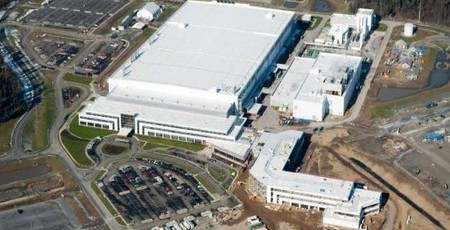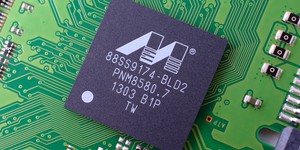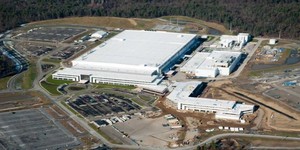GlobalFoundries puts 7nm on indefinite hold
August 28, 2018 | 11:31
Companies: #amd #globalfoundries #taiwan-semiconductor

GlobalFoundries has seemingly joined Intel in discovering that the march to ever-smaller semiconductor fabrication process nodes is getting increasingly difficult, announcing that it is putting its 7nm FinFET programme on hold 'indefinitely' - leaving former owner AMD relying on rival Taiwan Semiconductor (TSMC) as the sole source for its next-generation parts.
Formed as The Foundry Company when then severely cash-strapped AMD opted to spin its manufacturing arm out and become a fabless semiconductor company, GlobalFoundries formally declared that it would skip the 10nm manufacturing node in favour of 7nm back in 2016 - even as industry giant Intel was struggling, and continues to struggle, to hit 10nm for its in-house production. 'The industry is converging on 7nm FinFET as the next long-lived node, which represents a unique opportunity for GlobalFoundries to compete at the leading edge,' claimed chief executive Sanjay Jha at the time. 'We are well positioned to deliver a differentiated 7nm FinFET technology by tapping our years of experience manufacturing high-performance chips, the talent and know-how of our former IBM Microelectronics colleagues and the world-class R&D pipeline from our research alliance. No other foundry can match this legacy of manufacturing high-performance chips.'
Two years on, though, and things aren't going well - in fact, they're going badly enough that GlobalFoundries has announced it won't be hitting 7nm any time soon, saying it will put its 7nm FinFET programme on hold indefinitely. The company is, however, spinning its failure to hit its target as a positive: 'Demand for semiconductors has never been higher, and clients are asking us to play an ever-increasing role in enabling tomorrow's technology innovations,' claims new chief executive Tom Caulfield. 'The vast majority of today's fabless customers are looking to get more value out of each technology generation to leverage the substantial investments required to design into each technology node. Essentially, these nodes are transitioning to design platforms serving multiple waves of applications, giving each node greater longevity. This industry dynamic has resulted in fewer fabless clients designing into the outer limits of Moore's Law. We are shifting our resources and focus by doubling down on our investments in differentiated technologies across our entire portfolio that are most relevant to our clients in growing market segments.'
AMD's former spin-out is also to spin out a portion of itself, apparently repeating history: The company has announced that it will create a wholly-owned subsidiary specific to application-specific integrated circuit (ASIC) design and intellectual property, a business division which potentially puts it in direct competition with many of its customers.
For AMD, GlobalFoundries' decision to halt the march to 7nm is a blow: The company has already pledged to build its next-generation processors on a 7nm process node, and with GlobalFoundries bowing out of the race the company has been forced to settle on a single supplier: Taiwan Semiconductor. 'To streamline our development and align our investments closely with each of our foundry partner's investments, today we are announcing we intend to focus the breadth of our 7nm product portfolio on TSMC's industry-leading 7nm process,' AMD chief technology officer Mark Papermaster confirms in a blog post 'We also continue to have a broad partnership with GlobalFoundries spanning multiple process nodes and technologies,' he adds, confirming that the company's 14nm and 12nm process nodes will be used for future AMD products.
The shift to all-in with TSMC for its leading-edge product could cost AMD dearly, however: The company's wafer supply agreement with GlobalFoundries has long included terms under which AMD is forced to pay an unspecified fee to GlobalFoundries for every wafer it receives from any of the company's rivals - including TSMC.

MSI MPG Velox 100R Chassis Review
October 14 2021 | 15:04








Want to comment? Please log in.